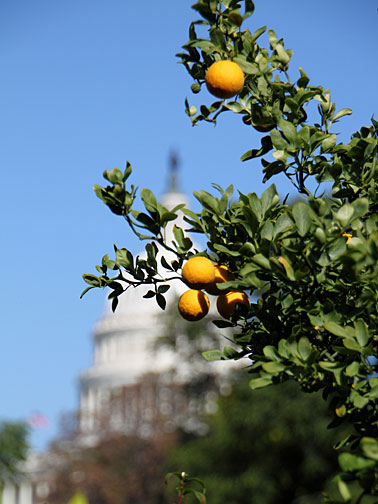From Labor Issues to HLB Research: A Look at Ongoing Challenges for the Year
Florida’s citrus industry is seeking $9 million from the state Legislature this year as it battles citrus greening, or Huanglongbing (HLB), a potentially devastating disease spread by the Asian psyllid.
“Our primary issue this year is to secure funding for HLB research,” says Andrew Meadows, communications director for Florida Citrus Mutual, a Lakeland-based growers’ cooperative. “We’re asking for $9 million total, $8 million of that would go towards research.” The remainder would be split 50-50 between psyllid management efforts and a citrus budwood facility in Chiefland, he elaborates.
Florida Gov. Rick Scott has proposed a $74.2 billion budget for the 2013-2014 fiscal year, up from $70.2 billion appropriated for this year. Meadows says $5 million is allotted for citrus, which is “extremely positive.” But he makes the point that “we’re going to stay up there … and keep educating legislators.” The citrus industry has an annual impact of $9 billion and employs nearly 76,000.
Agricultural leaders are standing together on issues like funding for the University of Florida’s Institute of Food and Agricultural Sciences (IFAS) and the Florida Department of Agriculture. “We work as a team. That’s been very effective for us,” says Sam Ard, who manages governmental affairs for Florida Cattlemen’s Association. “You really can’t do anything on your own other than get run over.”
Cindy Littlejohn, chairwoman of the Florida Agriculture Coalition, says the IFAS budget is a concern, while university funding undergoes scrutiny. “IFAS is hard to understand unless you’re in the business,” she explains. “We spend a lot of time trying to help people understand how important they are. We’re just saying do no harm to IFAS.” A federal/state/county partnership, IFAS provides educational resources to the community and research and development for agriculture and natural resource industries.
Some ag leaders are saying they want the Legislature to just let them continue business as usual. “The big issues out there really aren’t directed at ag,” Ard puts forth.
Other concerns include:
• Greenbelt law, which enables ag landowners to pay lower taxes — “While agriculture is always reticent to open up the Greenbelt law, the stars have aligned and we have the opportunity to update several outdated provisions to this essential law,” says Jim Spratt, who serves as the governmental liaison for the Florida Nursery, Growers and Landscape Association (FNGLA).
• Agritourism — “FFBF (Florida Farm Bureau Federation) is working on legislation that limits the ability of local governments to regulate agritourism activities on land that is classified as agricultural,” says Adam Basford, FFBF’s director of State Legislative Affairs.
• Water — “FNGLA will be working with various stakeholders on bills relating to consumptive use permitting, water quality credit trading programs, alternative water supply development and minimum flows and levels and long-term water supply planning,” Spratt says. “While it is still early to highlight all the specifics, the end game will protect nursery and landscape businesses’ water supply now and into the future.”
“FFBF supports science-based regulations that take into account agriculture’s dependence on a consistent water supply and consistent progress in keeping Florida’s water clean,” Basford says.
• Having a stable regulatory atmosphere for business.
Tomato growers’ hope the federal government will grapple with their top issue: Immigration. “We’re a handpicked commodity. We have no choice but try to retain a labor force. We would welcome resolving this issue for the long term,” says Reggie Brown, executive vice president of Florida Tomato Exchange.
“FNGLA has breathed a welcome sigh of relief that leaders like U.S. Sen. Marco Rubio (R-Miami) have made the bold decision to champion comprehensive immigration reform in Washington,” Spratt says.
FFBF officials agree it’s a federal issue. “Without a viable federal guest-worker program, virtually anything that the Florida Legislature passes will make it more difficult for Florida farmers to find workers,” Basford says.
Meanwhile, berry growers report only one concern. “The only issue we have is we don’t want any action taken to remove our ability to use bird cannons to scare birds out of the fields,” says Florida Blueberry Growers Association President Bill Braswell.
“There’s really nothing on the state agenda that’s overly concerning,” adds Ted Campbell, executive director of the Florida Strawberry Growers Association.
As agriculture lobbyists prepare for the upcoming session of the Florida Legislature, the routine is a familiar one. “It’s Groundhog Day. It’s the movie all over gain,” quips Ard, referring to the movie about a weatherman who keeps reliving the day he covers a Groundhog Day celebration.
CREDIT
story by CHERYL ROGERS

